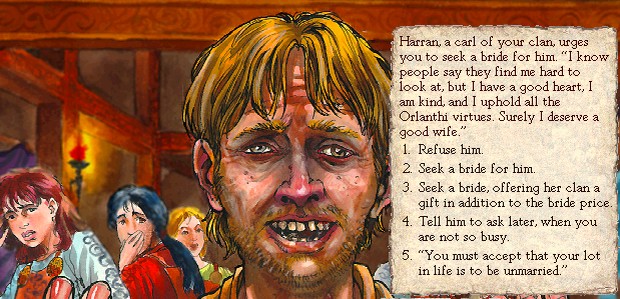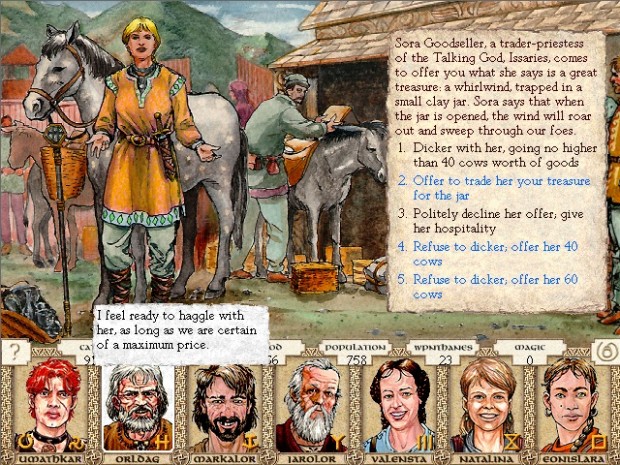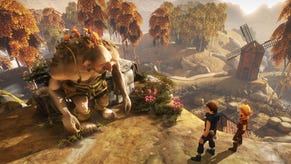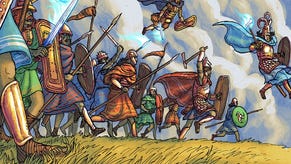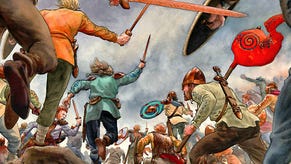Remembering King Of Dragon Pass
Wail to the King
King of Dragon Pass was first released on PC in 1999, but its mixture of strategy, management and RPG, and its focus on offering the player meaningful choices at every turn, was sadly overlooked at the time. We asked Sin Vega to explain why you should still play the game today.
We've all dreamt about ruling over a tribe, right? And let's be honest with ourselves, it's not really about the feasting, the comely milkmaids, or even the apocryphal helmets. No. It's about the decisions.
There you are, lounging regally and probably inebriated on your throne, and in come some people with a complaint. "Ugrim stole my axe!", shouts one. "That's a bastard lie," screams Presumably Ugrim, kicking over a nearby cow, "you're just jealous of my fabulous beard!". Wearily, you motion to your advisors, who tell you all about these two, what's really going on, what the laws say you can do, and that you could at least limit yourself to only drinking from one flagon at a time when the people are watching.
"Ugrim's beard is indeed magnificent," you decide, with very little slurring, "but that is not your axe, is it Ugrim?"
"Oh, was I still holding that? Bugger."
(THEY KISS)
Treat that whole exchange with slightly more dignity, and that's King of Dragon Pass, that is.
Set in the mercifully non-D&D world of Glorantha, King Of Dragon Pass puts the player in charge of a settlement in a dangerous land home to strange monsters, spirits, and assorted weirdoes. The goal is to unite the villages and become King or Queen, but you won't be conquering anyone, nor will you culture-hug or power-economy your way through, smothering your opponents in money or destroying their will to resist with daytime tv. Instead, you'll win people over with your just and wise decisions.
Oh, you'll do plenty of fighting. Your people, the Orlanthi, are culturally bound to regular punch ups, with even peace tribes getting antsy if they go for too long without a rousing game of Bludgeon. And you'll get nowhere without prosperous farms, shiny baubles, and fat stacks of cow. And don't expect to get a sniff of the throne without magic, be it smiting your foes, blessing your crops, or plain old sucking up to the gods. But whatever path you choose, however strategically-minded you are, what really matters is how you respond to the many questions people will bring to you. It's bloody hard. And it's bloody good fun.
While the decisions are yours, you're not alone. You choose a 'ring' of seven nobles, each with a degree of knowledge in a handful of areas. Their faces will sit at the bottom of the screen, always ready with advice based on their skills, their favoured god, and their personality. They will seldom agree, and this is where the fun starts.
You'll initiate actions in most seasons, and also face random events such as a flood, an argument between nobles, or a visit from some priests. You'll eventually see events repeated, although some are extremely rare, and many are dependent on specific circumstances or prior decisions.
Advisors and named invididuals will age and die. Godly strife might spill over into the mortal realm. Creatures you meet might remember a promise your people made decades ago, and expect you to uphold it. You can often tell people to shove off, even if it's a really stupid idea. And everyone has an opinion. In one game I dismissed a petty farming dispute that spiralled into a family feud spanning two villages and three generations, and continued long after the originators died.
People and consequences. It ought to be a genre of its own.
As an introduction, you're given a potted history of your tribe. Though the world has a rich and colourful background, this isn't the usual "please immediately skip me" RPG snoozefest. It's both character creation and a hint of what to expect. Before it even starts, it demands decisions. Will your people celebrate a godly marriage by getting your men drunk, or sending your women to learn magical secrets? Will your people be bitter enemies of the trolls, or the ice demons?
It doesn't matter what you pick. It matters what you pick.
Regardless of your choices, most player clans start out about equal - there are no innate racial bonuses or penalties. Instead, the decisions you made beforehand define how your ancestors acted, and ancestral spirits are close to gods. Displease them and they'll punish you, your people will be unhappy, and your magic will go all floppy and useless. And it's here where KODP really comes out as an RPG. If your ancestors remained neutral when the dragonfolk approached, you shouldn't get involved with dragonfolk. That manifests in odd ways - if you find a dragon's corpse, rather than sell it, or make armour out of it, your ancestors would prefer that you ignored it.
Those weird guys your explorers have encountered - they seem friendly, right? Well they might be on the level. They might even make good allies. But they're technically beastmen, and beastmen are your ancestral enemy, so don't even try thinking about being nice. Stab those suckers in the head. Grandma will be proud, you big xenophobic dick. Your ancestors took slaves? Well then, slavery is expected.
KODP doesn't care about modern morality. It doesn't reward you for being nice, or efficient, or mercenary. Instead, the many parties that make up the world react to you depending on their own weird ideas of morality, their own politics, their own needs. You have to do the same. If you apply modern values to it, you'll never get anywhere.
And yet, it's not rigid. Orlanthi laws and customs aren't laid out in black and white - a great design strength, as it doesn't get bogged down in rules, or demand that you memorise an encyclopedia. Your only guide is what people tell you, and they'll openly admit they're not sure sometimes. As in real life, there are situations where the right answer isn't clear to anyone, and not even appealing to tradition can help. Few choices are hard coded, and you can get away with defying your ancestors, subjects, or even the gods themselves, within reason. Your ancestry isn't your only concern, and nobody's perfect. The game understands this. The people understand this, and there's nuance in their opinions. Before long you'll make a decision that the people dislike, but respect because they see reason in it. Sometimes you can appeal to authority and say "I'm the chief, it's your place to obey", and they'll be fine with this. Hell, you can resolve some crises by composing a poem. Drama bombs can be defused.
Sometimes. With so many background variables, even the exact same decisions can have different results. Telling someone to calm down might work on one occasion, but a second time could only piss her off even more (side note: its attitude to women is pretty great. Men do most of the fighting, but women are capable as fighters and leaders, and ring membership is as meritocratic as you are).
There's nothing quite like King of Dragon Pass. In its days it'd be best described as a cross between Lords of the Realm, Darklands, and Hidden Agenda, and even now it's basically peerless. Many games claim to offer choice, but railroad you into making the same ones always, or offer a simplistic binary option, tethered to game-oriented notions of 'pick a reward', monochrome extremes of kitten-petting-versus-baby-eating morality, or both (did I mention there's a cult of cat lovers? I offered them some kittens and they cried because they were "too beautiful". It has just the right hint of silliness). It's a rare game that captures the complexities of leadership without getting bogged down. I'd imagine that coding and writing and balancing all the permutations of every possible acton was a nightmare, but someone clearly put the work in.
Crusader Kings 2 is perhaps a distant cousin, but The Banner Saga is the only game that can really claim descendance, with both its Viking-esque theme and event chains sparked off by your decisions. It deserves a better legacy. It's an RPG without the potions and sidequests and goddamn rats. It's a management game without the build orders or arms races. It's about people. People and consequences. That's life, that is.


